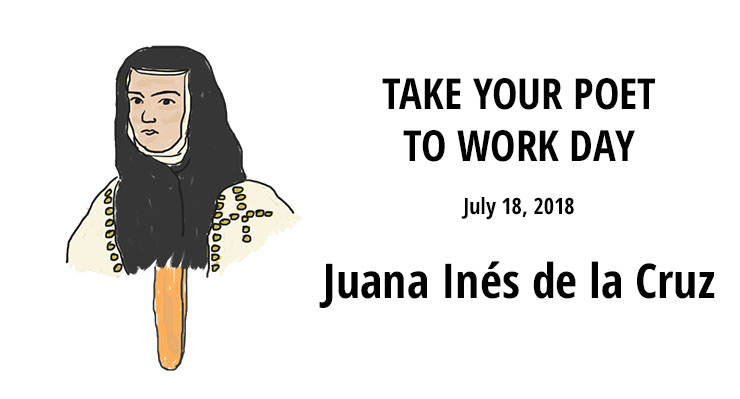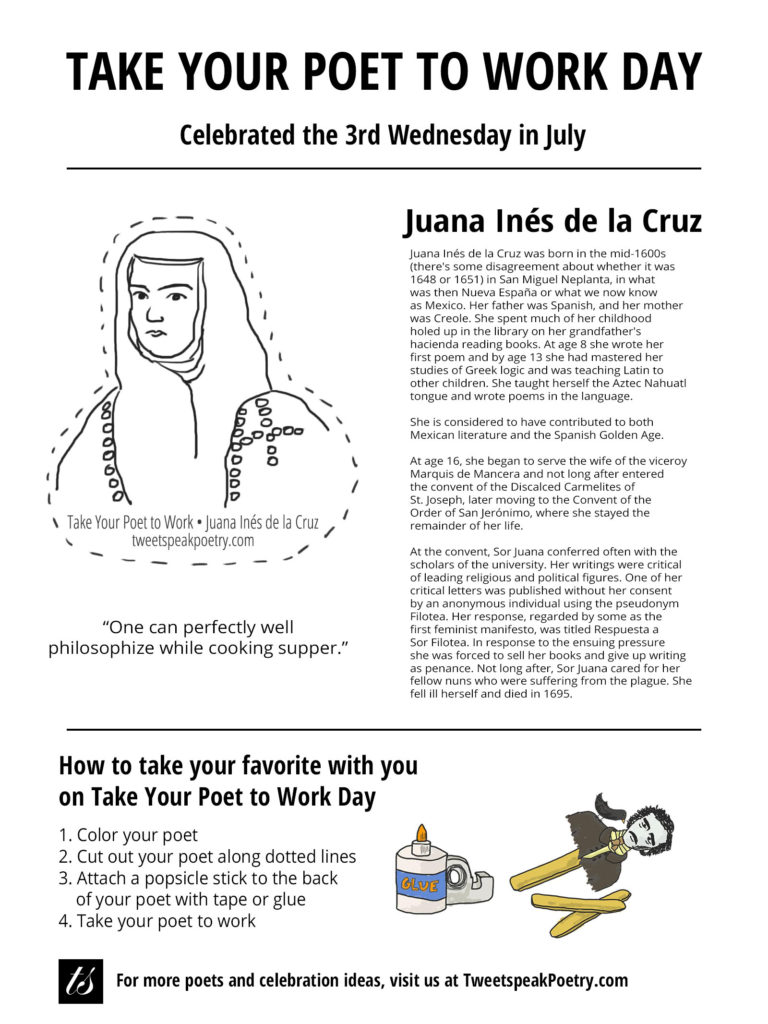Summer is one of the happiest seasons at Tweetspeak Poetry, because it is the season of Take Your Poet to Work Day (or, you know, to the beach). It’s one thing to start every day with a poem (we recommend it). But how great would it be to start your day with a poet? On Take Your Poet to Work Day, we encourage people around the world to take their favorite poet to work for the day.
Take Your Poet to Work Day is coming July 18, 2018
To help you play and celebrate with us, we’re releasing poets each week in a compact, convenient format you can tuck in your pocket, tool belt, or lunchbox.
We started our celebration five years ago with Sara Teasdale, Pablo Neruda, T. S. Eliot, Rumi, Edgar Allan Poe, and the reclusive Emily Dickinson (for folks who work at home).
We even released a full collection, The Haiku Masters: Matsuo Basho, Yosa Buson, and Kobayashi Issa.
In 2014, we added Langston Hughes, Adrienne Rich, John Keats, William Butler Yeats, Christina Rossetti and the beloved 20th-century American poet, Sylvia Plath.
In 2015, we introduced the Bard of Avon William Shakespeare, beloved poet Maya Angelou, and iconic American poet Robert Frost, Russian poet Anna Akhmatova, Polish poet Wisława Szymborska, and America’s poet, Walt Whitman.
In 2016, English Romantic poet William Wordsworth, joined in, along with Elizabeth Barrett Browning, Irish poet Seamus Heaney, and English poet and novelist Emily Brontë, Australian poet and activist Judith Wright, and Henry Wadsworth Longfellow.
Because you can never have too many poets in your lunch box (or your desk drawer), we launched a new school-year celebration in April, Take Your Poet to School Week, with some favorites for the younger (and younger-at-heart) poetry readers: Shel Silverstein, Ogden Nash, Robert Louis Stevenson and the always delightful Mother Goose.
This year, we started off our new releases with Jorge Luis Borges and Rosalía de Castro. Today, meet Sor Juana Inés de la Cruz.
Take Your Poet to Work: Juana Inés de la Cruz
Juana Inés de la Cruz was born in the mid-1600s (there’s some disagreement about whether it was 1648 or 1651) in San Miguel Neplanta, in what was then Nueva España or what we now know as Mexico. Her father was Spanish, and her mother was Creole. She spent much of her childhood holed up in the library on her grandfather’s hacienda reading books. At age 8 she wrote her first poem and by age 13 she had mastered her studies of Greek logic and was teaching Latin to other children. She taught herself the Aztec Nahuatl tongue and wrote poems in the language.
She is considered to have contributed to both Mexican literature and the Spanish Golden Age.
At age 16, she began to serve the wife of the viceroy Marquis de Mancera and not long after entered the convent of the Discalced Carmelites of St. Joseph, later moving to the Convent of the Order of San Jerónimo, where she stayed the remainder of her life.
At the convent, Sor Juana conferred often with the scholars of the university. Her writings were critical of leading religious and political figures. One of her critical letters was published without her consent by an anonymous individual using the pseudonym Filotea. Her response, regarded by some as the first feminist manifesto, was titled Respuesta a Sor Filotea. In response to the ensuing pressure she was forced to sell her books and give up writing as penance. Not long after, Sor Juana cared for her fellow nuns who were suffering from the plague. She fell ill herself and died in 1695.
Excerpt:
And when the blows refused to end,
and my surrendered heart to mend—
in the final throws, in the blood’s last sigh—
a strange magic rescued me just then.
I came back. But why should I live? Why?
For who, in love, has been luckier than I?
— from “The Ripcord of Love” tr. by Ada Limón & Cyrus Limón
Get your own Juana Ines de la Cruz Take Your Poet to Work Printable that you can print, color and cut out for the big day.
Post and illustrations by Will Willingham.

Click to get 5-Prompt Mini-Series
- Earth Song Poem Featured on The Slowdown!—Birds in Home Depot - February 7, 2023
- The Rapping in the Attic—Happy Holidays Fun Video! - December 21, 2022
- Video: Earth Song: A Nature Poems Experience—Enchanting! - December 6, 2022



[…] year, in 2018, we introduced Jorge Luis Borges, Rosalía de Castro, Sor Juana Inés de la Cruz, and Rosario […]